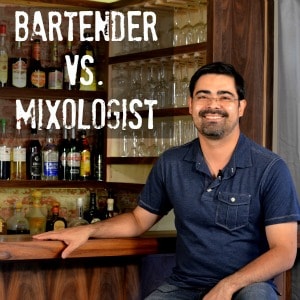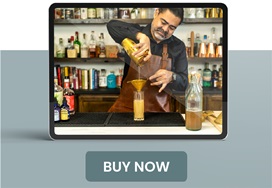I truly think the words refer to different roles, both important for a great bar experience.

Here’s my take on the terms
“Bartender” & “Mixologist”:
The Mixologist:
- Designs cocktails that are seasonal and / or aligned with the style of the establishment
- Prepares any house-made syrups, tinctures, bitters, or other ingredients that a bartender will need for service
- Selects ingredients behind the bar that are high quality and again, aligned with the bar or restaurant.
- Does his or her work before the guests arrive
The Bartender:
- Is completely focused on the guests.
- Make guests feel welcome, entertained and attended to. Be a friend or companion.
- To make great drinks for the guests – possibly utilizing the recipes & ingredients prepared by the Mixologist
So that’s my opinion – What’s Yours?
Is the term “mixologist” worthwhile? Do you agree with how I describe it above? Let me know in the comments or send me a message on Twitter @ABarAbove!
Click Here to view the Transcript
Hi, everyone and welcome back to ABarAbove.com! My name is Chris and I realized earlier today when we were getting ready to do a video that we have a couple of videos under our belt now and it’s always been a concentration on the leap from bartender to mixologist, but we’ve not actually defined their roles and the difference between the two.
So today we’re going to have a conversation about the difference between the two, define the two different roles, and kind of show you what my intentions are with this business, which is to create a platform for mixologists. So if you’ve been in the business long enough or if you’re a cocktail aficionado, the term “mixologist” can mean many different things: it could be the bar chef, it could be the guy behind the bar that knows the most about cocktails, it could mean that you have the most tattoos and a handlebar mustache and a bad attitude. You see, there are many different meanings and connotations on the word mixologist.
The one I liked the most is actually from an interview done with Dale DeGroff, who is essentially the one man responsible for creating this type of bartending or bringing this back to light from the historic times. His definition of mixologist was, back in the 1800s, they were the caretakers of the product behind the bar so they would receive barrels of whiskey that were still at barrel strength. And their job as mixologists was to bring that barrel strength whisky down to drinkable level by adding water to it. Also, they would be responsible for making products like gum syrup and fresh juices and creating the recipes that the patrons would be drinking for the day. I believe that we can take a lot from that context and bring all that information to modern setting.
I feel like our roles as both bartender and mixologist are essentially the same role. We’re in the customer service business: we’re here to make our guests happy, we’re here to deliver the amazing product and make them feel comfortable in the environment. And hopefully, the intention is that they keep coming back: that they come back and develop a bond with you guys and love our products. So my definition of mixologist is customer service before the customer even walks in the door. That means that we’re creating all the recipes, that we’re creating all the syrups, that we’re creating all the infusions, we’re making very deliberate decisions on what alcohol that we’re putting behind our bar, getting the best ingredients that we can get our hands on for our guests. The focus on mixology is a deep understanding of products, then build it to mix amazing cocktails, and put that in the hands of our bartenders, so that way it flows right directly into the atmosphere and into what our guests come back for.
Now as bartenders our role is to make people feel comfortable, to give them the best experience at our bar, to introduce them to other people and create a bond with them. One of the interviews I was reading was with Gary Regan who is another legend in our business. He was asked this very question: “What’s the difference between a bartender and a mixologist?” And his answer, very poignant and clear, was: “A mixologist will make an amazing cocktail that you will remember that night; a bartender will make an amazing night for you that you will remember forever.” So that is a big difference between the two and that’s kind of what I take from it as well. When I go in to work, when I’m creating my syrups and infusions and barrel-aged programs and all these other types of cocktails, that’s when I feel like mixology is a part of the business.
When I put on my jacket, when I put on my tie and I get behind the bar, my role is now a bartender. So all the work in mixology is done before I ever hit the floor and now my role is to create a comfortable environment for my guests as a bartender. So in summary, I’m very proud to call myself a mixologist: I feel like I have a very deep understanding of my craft and its historical context. But I also feel very proud of my abilities and skills as a bartender and make my guests keep coming back and developing a relationship with them. So that’s it, that’s my take on mixology and bartending. I hope you guys have a great shift. If you disagree or if you have your own viewpoints, please leave them at the comments underneath. But either way, thank you again for watching and hope to see you soon! Cheers!




I believe that’s the best description I’ve found yet. Thank you!!
J2
Bartender & Mixologist
Rosie O’Grady’s
San Diego
Thank you!
very well said
I agree with that definition aside from the idea that a mixologist does all his or her work before the customer gets there; because he or she would be a master of the art of communication, personality, and persuasion as well. And mixologist is one that creates not only bitters and tinctures mixtures liqueurs and infusions, but carries with that and a superior knowledge of liquors beer and wine. They are a creator and iovator as apposed to a memorizor and a speed well freak. Mind you this is not a somme but the next step would be a Somme in the progression in my opinion.
Fantastic description. Well Said.
Joe Daily
Director of Mixology, SGWS
sounds good to me – the best definition i have heard